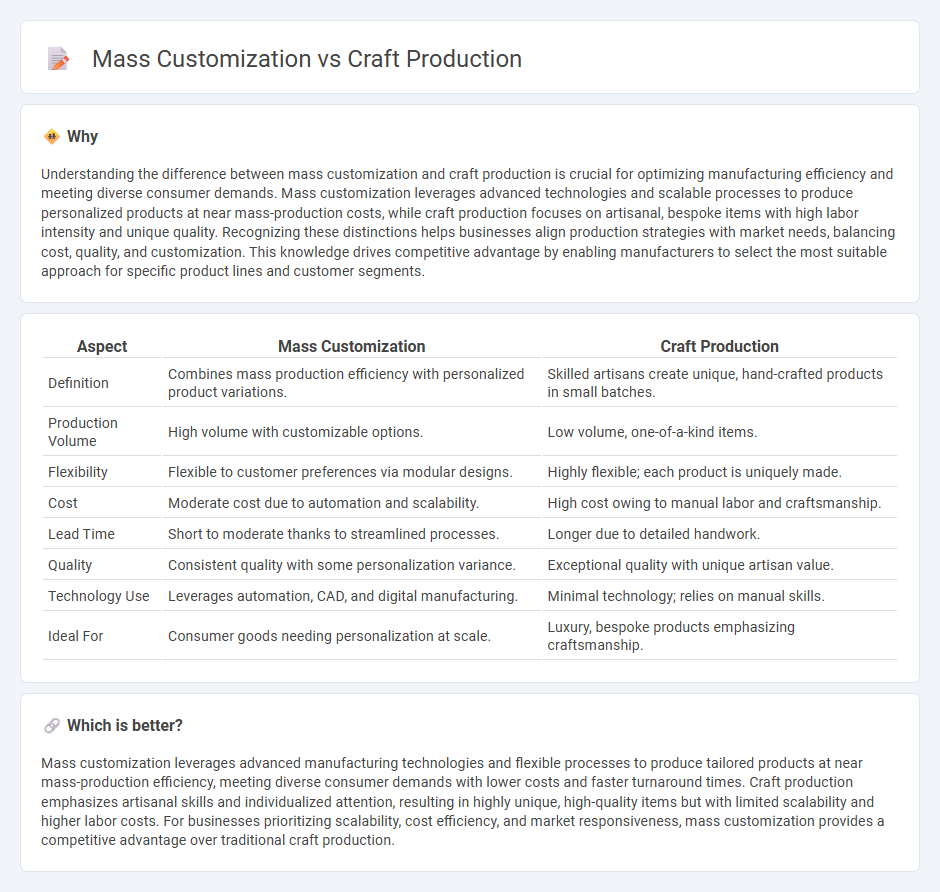
Mass customization integrates advanced manufacturing technologies and automated systems to produce personalized products at scale, balancing efficiency with customer-specific needs. Craft production relies on skilled artisans and manual techniques, delivering unique, high-quality goods with greater variability and limited output. Explore how businesses can strategically combine these approaches to optimize production and meet diverse market demands.
Why it is important
Understanding the difference between mass customization and craft production is crucial for optimizing manufacturing efficiency and meeting diverse consumer demands. Mass customization leverages advanced technologies and scalable processes to produce personalized products at near mass-production costs, while craft production focuses on artisanal, bespoke items with high labor intensity and unique quality. Recognizing these distinctions helps businesses align production strategies with market needs, balancing cost, quality, and customization. This knowledge drives competitive advantage by enabling manufacturers to select the most suitable approach for specific product lines and customer segments.
Comparison Table
| Aspect | Mass Customization | Craft Production |
|---|---|---|
| Definition | Combines mass production efficiency with personalized product variations. | Skilled artisans create unique, hand-crafted products in small batches. |
| Production Volume | High volume with customizable options. | Low volume, one-of-a-kind items. |
| Flexibility | Flexible to customer preferences via modular designs. | Highly flexible; each product is uniquely made. |
| Cost | Moderate cost due to automation and scalability. | High cost owing to manual labor and craftsmanship. |
| Lead Time | Short to moderate thanks to streamlined processes. | Longer due to detailed handwork. |
| Quality | Consistent quality with some personalization variance. | Exceptional quality with unique artisan value. |
| Technology Use | Leverages automation, CAD, and digital manufacturing. | Minimal technology; relies on manual skills. |
| Ideal For | Consumer goods needing personalization at scale. | Luxury, bespoke products emphasizing craftsmanship. |
Which is better?
Mass customization leverages advanced manufacturing technologies and flexible processes to produce tailored products at near mass-production efficiency, meeting diverse consumer demands with lower costs and faster turnaround times. Craft production emphasizes artisanal skills and individualized attention, resulting in highly unique, high-quality items but with limited scalability and higher labor costs. For businesses prioritizing scalability, cost efficiency, and market responsiveness, mass customization provides a competitive advantage over traditional craft production.
Connection
Mass customization integrates the flexibility of craft production with the efficiency of mass manufacturing, enabling personalized products at scale. Craft production's emphasis on skilled labor and unique, high-quality goods informs the design and customization processes in mass production environments. This connection allows manufacturers to meet specific customer preferences while maintaining cost-effective production methods.
Key Terms
Flexibility
Craft production offers exceptional flexibility by allowing artisans to adapt designs and processes to individual customer preferences, resulting in unique, high-quality products. In contrast, mass customization integrates flexible manufacturing systems and digital technologies to efficiently produce personalized goods at scale, balancing customization with cost-effectiveness. Explore how both approaches leverage flexibility to meet diverse consumer demands and drive innovation.
Scalability
Craft production excels in quality and uniqueness but faces challenges in scalability due to labor-intensive processes and limited production capacity. Mass customization leverages advanced technologies and flexible manufacturing systems to efficiently scale personalized products while maintaining cost-effectiveness. Explore innovative strategies to balance scalability with customization in modern production environments.
Individualization
Craft production emphasizes individualized products tailored to unique customer specifications, leveraging skilled artisans and customizable techniques. Mass customization combines the efficiency of mass production with the flexibility to adapt products to individual preferences using advanced technologies like modular design and digital manufacturing. Explore how businesses balance personalization and scalability to meet diverse consumer demands.
Source and External Links
What is Craft Production? - Craft production is the ancient method of making goods by hand without tools or instruments, resulting in unique, high-quality products distinct from mass-produced alternatives.
How to Make it in the Craft Production Business -- Katana - Craft production involves manufacturing products one by one by skilled artisans, emphasizing uniqueness and high quality, but requiring intensive skill and often relying on traditional, sometimes manual, methods.
Craft production - (AP European History) - Craft production is a manufacturing system where skilled artisans use traditional tools and methods to produce individualized, quality goods, prevalent especially before mass production took over during early industrialization.
 dowidth.com
dowidth.com